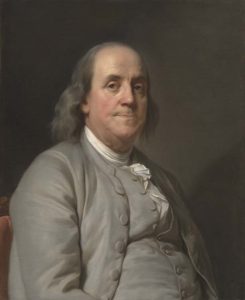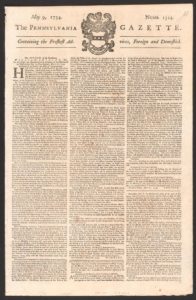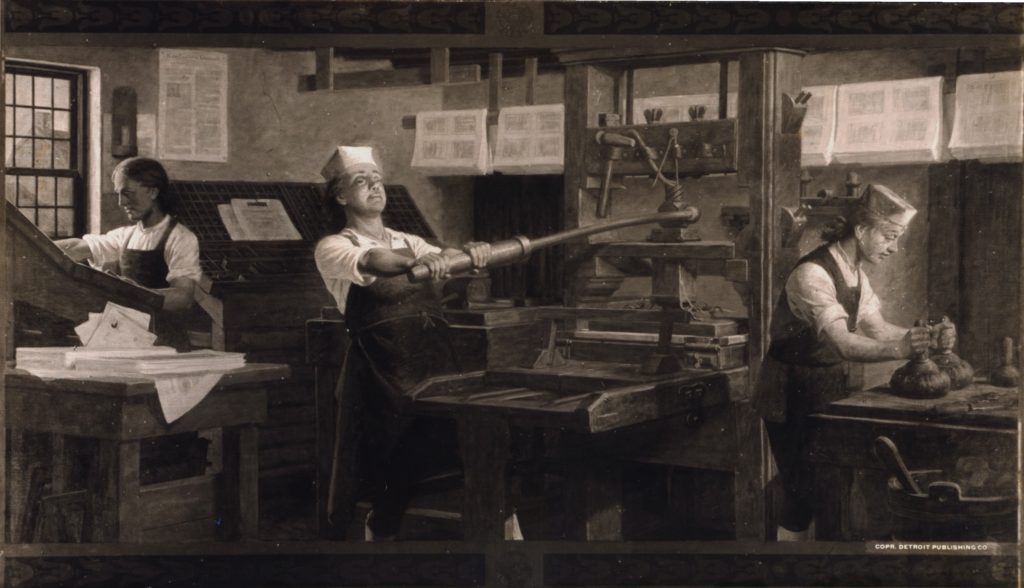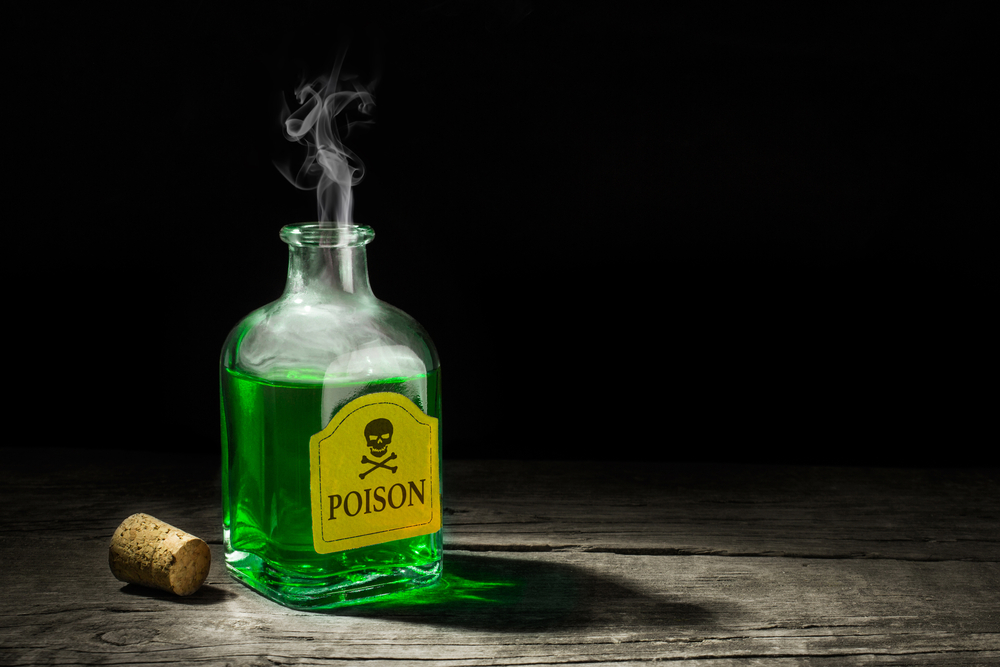
Benjamin Franklin. You know him as a founding father, a drafter of the Declaration of Independence, the discoverer of electricity, a diplomat. But did you know he wrote true crime, too?
He started his career as a printing apprentice and later purchased The Pennsylvania Gazette in Philadelphia. Although he said he would never pander to the morbid interests of his readership, Benjamin Franklin published a shocking true crime article in the Gazette on October 24, 1734 – one that has left scholars scratching their heads. Why would Franklin write this?
Here’s Benjamin Franklin’s short true crime piece. Read on to see what the scholars have to say.

“The Murder of a Daughter” by Benjamin Franklin
Saturday last, at a Court of Oyer and Terminer held here, came on the Tryal of a Man and his Wife, who were indicted for the Murder of a Daughter which he had by a former Wife, (a Girl of about 14 Years of Age) by turning her out of Doors, and thereby exposing her to such Hardships, as afterwards produced grievous Sickness and Lameness; during which, instead of supplying her with Necessaries and due Attendance, they treated her with the utmost Cruelty and Barbarity, suffering her to lie and rot in her Nastiness, and when she cried for Bread giving her into her Mouth with a Iron Ladle, her own Excrements to eat, with a great Number of other Circumstances of the like Nature, so that she languished and at length died. The Evidence against them was numerous, and in many Particulars positive; but the Opinion of the Physician who had visited the Child, that whatever Usage might be given her, the Distemper she laboured under was such, as would of itself in all Probability have ended her Life about the Time she died, it is thought weighed so much with the Jury, that they brought in their Verdict only Man-slaughter. A Verdict which the Judge, (in a short but pathetic Speech to the Prisoners before the Sentence) told them was extreamly favourable; and that, as the Relation of their hitherto unheard-of Barbarity had in the highest Manner shocked all that were present; so, if they were not perfectly stupified, the inward Reflection upon their own enormous Crimes, must be more terrible and shocking to them, than the Punishment they were to undergo: For that they had not only acted contrary to the particular Laws of all Nations, but had even broken the Universal Law of Nature; since there are no Creatures known, how savage, wild, and fierce soever, that have not implanted in them a natural Love and Care of their tender Offspring, and that will not even hazard Life in its Protection and Defence. — But this is not the only Instance the present Age has afforded, of the incomprehensible Insensibility Dram-drinking is capable of producing. — They were sentenced to be burnt in the Hand, which was accordingly executed in Court, upon them both, but first upon the Man, who offer’d to receive another Burning if so be his Wife might be excused; but was told the Law would not allow it.
Benjamin Franklin and true crime
Although he was fond of saying he wouldn’t pander to the “corrupt taste of the majority,” Benjamin Franklin didn’t always do what he said. The Pennsylvania Gazette was one of the most popular newspapers in the colonies, and Franklin didn’t object to printing sensational material to boost his readership. Crime and court proceedings are, after all, news. The Pennsylvania Gazette published a number of his articles covering incest, domestic abuse, and murder.
So why did he pick this horrifying account for his own press? Here are a couple of theories:

Benjamin Franklin wanted to express his distaste for crime
Robert Bosco, an English professor, doesn’t view “The Murder of a Daughter” as objective reporting. He thinks Franklin used the trial to express his contempt for human depravity. Underpinning that contempt might have been the statesman’s reservations about human nature.
Pennsylvania historian Randall Miller says Franklin was less optimistic of people’s ability to control their own destiny. That might boil down to a primal fear that Friedrich Schiller says makes true crime so suitable for literature – the fear that, but for the grace of God, that could have been me. That is one of the reasons readers are so fascinated by true crime.
Franklin scholar J.A. Leo Lemay isn’t even sure if the judge in the case actually spoke the pronouncement Franklin put in his mouth; the article might be an instance of Franklin editorializing. Franklin might have used the judge as his mouthpiece to condemn such depraved child abuse.
Lemay also points out how telling the ending is. No one can claim the abusive father was incapable of loving his daughter. His willingness to accept his wife’s punishment shows he was capable of self-sacrificing affection. Perhaps then, the difference between the abusive father at home and the self-sacrificing father in court might have been due to drink.

Benjamin Franklin wanted to condemn dram (whiskey) drinking
Benjamin Franklin had no objection to a drink, especially since water – in Europe at least, where Franklin lived for years – was considered unsanitary. He composed several drinking songs. He enjoyed wine, beer, and cider, but in moderation. Early experiences with his friends turned him against excessive drinking.
A childhood friend named Collins drank too much dram and had trouble finding a job. And Hugh Meredith, Benjamin Franklin’s first partner for The Pennsylvania Gazette, also had a drinking problem. Franklin tried to persuade him to lay off the bottle. Writing under the pseudonym Silence Dogood, Benjamin Franklin condemned drunkenness. His comment about “the incomprehensible Insensibility Dram-drinking is capable of producing” might have been meant to illustrate the evil monsters dram drinking can create within us.
There is, of course a third possibility, and that is that Benjamin Franklin just considered the case newsworthy and reported it accurately, like a modern true crime writer.
What do you think?
Literature on point:
J.A. Leo Lemay, The Life of Benjamin Franklin, Volume 2: Printer and Publisher, 1730-1747 (Univ. of Penn. Press, 2006)
Life of Benjamin Franklin: Embracing Anecdotes Illustrative of His Character (Lindsay & Blakiston, 1846)
Benjamin Franklin, “The Murder of a Daughter,” The Pennsylvania Gazette, October 24, 1734
Edwin McDowell, “A Darker Side to Franklin is Reported,” New York Times, August 18, 1987
Harold Schlechter, “Benjamin Franklin,” in True Crime: An American Anthology (Library of America, 2008)




This case probably hit Ben Franklin particularly hard because it involved a child in which the details of the case are especially horrible. We all know stories where mother dogs will beg for food at someone’s house or restaurant, and while hungry herself, she will travel with the food to go feed her puppies. The people in this case were far, far worse than what a dog will do for her puppies or a cat for her kittens. In addition, the punishment that the parents received seems far too light for the severity of what they did.
I believe that he was reporting it as a true case. We hear stories like this more often today than even sixty years ago, so I imagine in his time it was particularly upsetting and disgusting!
People like to talk about the “good ole days,” but one of the things I’ve learned in researching historical true crime is that the past wasn’t necessary better. Sometimes it was even worse. What’s so interesting is seeing Benjamin Franklin take up the topic. Thanks for commenting, Susan!